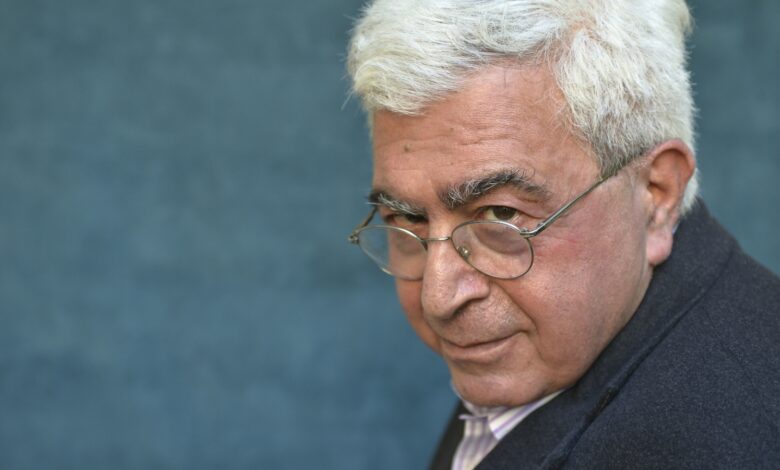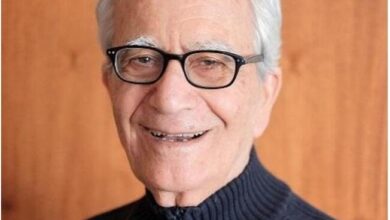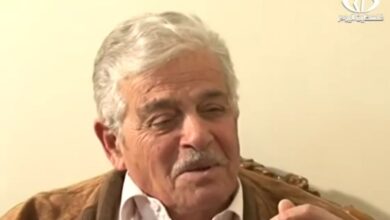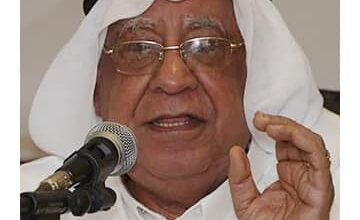Articles
An Attempt to eradicate Palestinian culture By Elias Khoury
By Elias Khoury Translated from Arabic by Ibrahim Ebeid

An Attempt to eradicate Palestinian culture By Elias Khoury
Palestinian artist Samia al-Halabi joined novelist Adania Shibli as they were paid the price for their positions on the Palestinian cause in the fever of Western hysteria that turned into Palestine phobia. Al-Halabi had her retrospective at Indiana University in the United States canceled. Shibli withheld from her novel Secondary Detail, the Frankfurt Fair in Germany prize for non-European literature. Halabi and Shibli are from two different generations, but what unites them is not only the memory of the 1948 Nakba but the ongoing Nakba that today reached its peak in Israel’s war of extermination in Gaza. Al-Halabi’s works and Shibli’s novels are of exceptional importance, and stopping at them is necessary because they illuminate new aspects of Palestinian life. Shibli documents and analyzes crime, and Al-Halabi draws it with the pulse of those who burned with its fire. The issue I want to address today concerns the persecution of Palestinian and pro-Palestinian culture in the world to create an equivalent to genocide in Gaza. Palestinian culture is today in danger of being exterminated, and its ability to resist is as essential as the ability of the fedayeen to forge the myth of steadfastness in Gaza. Why this coordinated attack on Palestinian culture in the West? The United States and its allies are indeed partners in the Gaza war on the military and political levels, but never before have intellectuals and artists gone so far as to pursue and threaten them with death. What’s up? In the past, no one dared to block the translations of Ghassan Kanafani’s books despite the accusation of terrorism attached to him by the Zionists in preparation for his assassination. Even in Israel, his books were not banned. Today, in a time of racism and brutality, anything is permissible. In fact, Israel was the first to launch this McCarthyite campaign by attempting to ban concerts by Palestinian rapper Tamer Nafar and by recently arresting artists Maysa Abdel Hadi and Dalal Abu Amna for writing pro-Gaza slogans on social media. The masquerade culminated in the arrest of Abu Amna, who wrote on Facebook the slogan “There is no conqueror but God,” and this slogan, which adorns the walls of the Alhambra Palace in Granada, was considered incitement against Israel. Israel’s history of persecuting poets and artists is not new, as it began with the establishment of the Hebrew state on the ruins of the Palestinian people. Still, what is new that takes us back to the worst days of American McCarthyism is this crackdown on all those who support the Palestinians and object to the massacres in Gaza, whether Palestinian, Mexican, or American. It is as if a decision was made to crush the Palestinians and silence them. From model Gigi Hadid, who was not only persecuted in the workplace but also received death threats from her and her entire family, to Hollywood, where the persecution of artists reached a peak with actress Susan Sarandon, the Oscar-winning actress whose contract was canceled, to the exclusion of Mexican actress Melissa Barrera from “Cream 7”, and the list goes on. English rock singer Roger Waters has had his concerts banned in Frankfurt and Munich on grounds of anti-Semitism. This is a small sample of the culture war that is spreading today in the West, especially in universities, where Palestinian students are subjected to various forms of persecution and even murder, and some university presidents are driven to resign. As for Israel’s chief historian, Ilan Pappe, the French publishing house Fayyar, which published a translation of his book “Ethnic Cleansing in Palestine,” withdrew the book from the market as a result of Pappe’s radical pro-Palestinian positions. Pappe wrote about the signs of the beginning of the end of the Zionist project, which is reason enough for his books to be withdrawn from the market, and in France, he is persecuted by a similar person at the University of Haifa. Palestine is not only a land and a people but a set of moral values you will always find someone to defend. The bottom line is that Palestinian culture today is in danger of being annihilated and that the Palestinian voice must be silenced. This is what happened in 1948, leaving only the ghost Palestinians in Israeli culture, persecuting refugees in countries of asylum, and the world believed that the question of Palestine could be reduced to the subsistence provided by UNRWA. But the surprise came from where they did not expect: Palestinian culture has restored itself through poetry first, reproducing identity at all levels, and the fedayeen have turned into new words of blood and sacrifice. The Israelis and their Western allies have learned their lesson well: if you want to eradicate or wipe out a people, you have to destroy and erase its culture in preparation for its final marginalization. This is a major battle they are waging using all kinds of weapons at hand, from the accusation of anti-Semitism to the conversion of Islamophobia to Palestine-phobia to the exposure of racism that has long been hidden in words, equality, and human rights. Israeli intellectuals, described by Edward Said at the height of the flourishing of Israeli literary and intellectual production as mere suburban intellectuals, seem to be on the sidelines in the face of the rise of Ben Gvir and other murderers and thugs. It is as if Zionist society, in its stage of brutality, seeks to marginalize the Palestinians by silencing them and crushing their culture. This is the battle that we must not underestimate, for the struggle for culture is one of the aspects of the fight for existence, and it is the battle of Arab culture as a whole, not just the battle of the Palestinians. Translated from Arabic by Ibrahim Ebeid on February 2024





